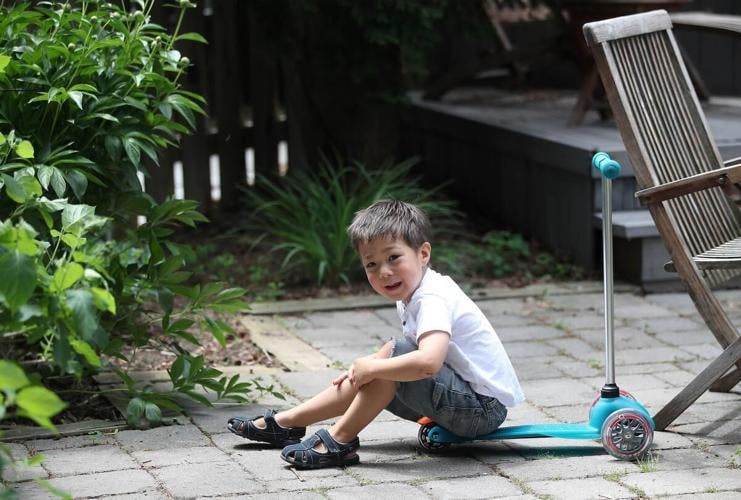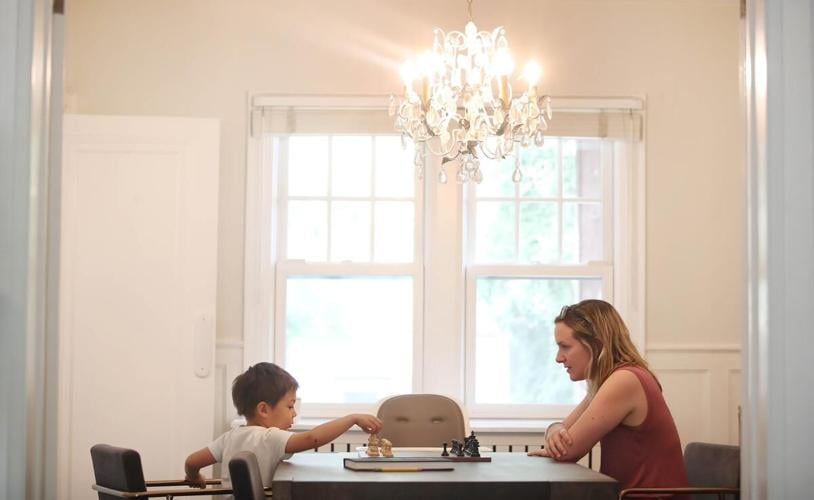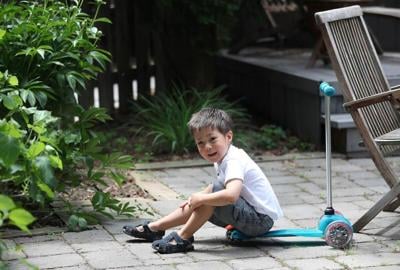Osher Ahn-Clifford is three-and-a-half feet tall with shaggy dark hair, brown eyes and a delightful giggle that sometimes sounds like an attack of hiccups. He wears jeans, sneakers and, as often as laundry allows, a favourite black T-shirt that bears the Pi symbol. He enjoys cruising through parks on his scooter, which is not blue but turquoise, and swimming laps in local pools with a water noodle. He paints pictures; of ladybugs in tall grass, a melancholy dog sniffing flowers, reindeer in a snowy forest. When he grows up, he wants to be a T. Rex. For now, he is a kid who is 4.
ŌĆ£And three-quarters,ŌĆØ he says, wriggling around on the sofa in his ║ŻĮŪ╔ńŪ°╣┘═°living room.
He is a kid who is 4 and three quarters.
The soon-to-be senior kindergartener also possesses intelligence rare and remarkable for a child so young. At 18 months old, Osher could count to 10. At 20 months, he could spell his name. He taught himself to read before age 2. He became fascinated with geography, memorizing 10 countries and capitals, then 110. Last year, Osher became the youngest Canadian member of Mensa, the society for people with high IQs. He knows nothing about his giftedness, for now. His parents just want him to be a kid.
Lori Ahn-Clifford was at first reluctant to speak about her sonŌĆÖs abilities. She has seen how academically advanced children are often stereotyped as awkward child geniuses or robot kids exclusively focused on achievement ŌĆö one-dimensional portraits that donŌĆÖt reflect their broader interests and abilities, or their personalities. She has also seen the parents of gifted children unfairly accused of ŌĆ£hothousingŌĆØ or ŌĆ£tiger parentingŌĆØ their kids, when many are simply doing their best to manage a delicate balancing act: staying attuned to their childŌĆÖs naturally advanced pace without giving them too much or too little encouragement.
ŌĆ£Most parents donŌĆÖt realize that itŌĆÖs the child that has the really strong desire to learn these things,ŌĆØ she said.
Lori wanted it to be clear that she and her husband did not sign Osher up for the high-IQ society as a marker of accomplishment.
When Osher was in preschool, Lori searched for enrichment programs she thought he might enjoy and came across an online chess class offered by the Johns Hopkins Center for Talented Youth, which she discovered after striking out looking for gifted programs at her sonŌĆÖs age level in Toronto. An IQ test was a prerequisite for enrolment, so she and her husband decided to have Osher tested, explaining to him only that he was going to ŌĆ£play some fun games with someone today,ŌĆØ Lori said.
Lori is not comfortable revealing the result of the test, but it was extraordinary. When Mensa came up in a conversation, Lori initially brushed it off, but then wondered if membership might connect Osher with other gifted children. So far, he has had no trouble making friends in his class at school, but they donŌĆÖt always share the same interests. Lori sent in the Mensa application and inquired about kids OsherŌĆÖs age.
ŌĆ£We got crickets,ŌĆØ Lori said. ŌĆ£We were looking for a tribe, and there was no one.ŌĆØ

Osher loves dinosaurs and considered being one when he grows up.
Steve RussellParents of gifted learners will find no shortage of disconcerting stories online about the pitfalls of exceptionality, with headlines like, ŌĆ£Young, gifted and likely to suffer for it,ŌĆØ and tales of so-called child prodigies who buckled under the weight of high expectations.
Prodigiousness ŌĆ£looks from a distance like silver, but it comes with banks of clouds,ŌĆØ Andrew Solomon, a Cornell University psychiatry professor, wrote in an essay for the New York Times adapted from his book, Far from the Tree: Parents, Children, and the Search for Identity.
ŌĆ£While it is true that some parents push their kids too hard and give them breakdowns, others fail to support a childŌĆÖs passion for his own gift and deprive him of the only life that he would have enjoyed,ŌĆØ Solomon wrote. ŌĆ£You can err in either direction.ŌĆØ
Every child is different and there is no clear line between support and pressure. Studying the families of gifted children, Solomon wrote, ŌĆ£I gradually recognized that all parenting is guesswork, and that difference of any kind, positive or negative, makes the guesswork harder.ŌĆØ
Lori, an online marketing manager, and her husband, Michael Clifford, a web designer, did not immediately register OsherŌĆÖs abilities as remarkable. He was their first child, so they had no point of comparison. ŌĆ£We sort of had an inkling he was ahead, we knew other kids his age werenŌĆÖt counting yet, but we didnŌĆÖt think it was a big deal,ŌĆØ Lori said.
Sometime between 18 and 24 months, Osher developed a deep interest in sounds and the alphabet. ŌĆ£We were about to teach him letters, but then we realized he already knew how to read,ŌĆØ Lori said. He could sound out and read words they wrote on paper ŌĆö ŌĆ£stop,ŌĆØ ŌĆ£here,ŌĆØ ŌĆ£top.ŌĆØ They were blown away.
Recognizing his interest in words, Lori and Michael began to introduce him to new things. They hung a world map in their living room and taught him countries and capitals, which he loved. He learned 110, then lost interest. They switched to a periodic table. He memorized 66 elements before growing tired of that, too. Lori said they have been careful never to push anything beyond his interest.
In the past, children like Osher may have been called a ŌĆ£geniusŌĆØ or a ŌĆ£child prodigy.ŌĆØ Now many psychologists and educators recommend steering away from such terms, and even ŌĆ£giftedŌĆØ is falling out of favour. (ŌĆ£Advanced learnerŌĆØ has become a popular alternative.)
ŌĆ£We donŌĆÖt particularly like the word ŌĆśgiftedŌĆÖ because it sounds exclusive or elitist, and thatŌĆÖs neither descriptive or helpful,ŌĆØ Lori said.

Osher shows off some of his artwork.
Steve RussellThe research of Stanford University psychologist Carol Dweck, who spent decades studying achievement and success, has been pivotal in changing the thinking on how to raise and educate children with extraordinary abilities. Dweck advocates fostering a ŌĆ£growth mindset,ŌĆØ which encourages motivation and productivity, rather than a ŌĆ£fixed mindset,ŌĆØ which assumes ability cannot change.
Lori and Michael are trying to foster a growth mindset. ŌĆ£All kids need to be challenged,ŌĆØ Lori said. ŌĆ£If theyŌĆÖre not challenged they donŌĆÖt learn how to face failureŌĆØ and may face the consequences later in life.
The ŌĆ£giftedŌĆØ label may sound like a privilege, but it can be a lifelong challenge for parents. ŌĆ£In many ways, itŌĆÖs no different than being told your child has a learning disability,ŌĆØ said Dona Matthews, a ║ŻĮŪ╔ńŪ°╣┘═°psychologist and author or co-author of several books, including Beyond Intelligence: Secrets for Raising Happily Productive Kids. ŌĆ£When your child has special learning needs, youŌĆÖre going to be dealing with that as a parent through to the end of their education.ŌĆØ
Matthews recommends parents avoid the label of giftedness, except for in the educational system, where they may have to advocate for appropriate learning opportunities. Parents should strive to give their children ŌĆ£age-normalŌĆØ experiences, she said. ŌĆ£Your child is a child first, remember that,ŌĆØ she often tells the families she works with. ŌĆ£DonŌĆÖt let this gifted thing take over. ItŌĆÖs not the most important thing about your child.ŌĆØ
ŌĆ£Remember that thereŌĆÖs a whole lot of learning in life that has nothing to do with giftedness ŌĆö learning about how the world works, how to interact with people, social and emotional learning.ŌĆØ

Osher Ahn-Clifford gets some snuggles from his father, Michael Clifford.
Steve RussellLori and Michael seem to have adopted that wisdom as part of their parenting approach. Osher enjoys rock climbing, birthday parties, playing piano. He loves playing Prodigy, a web-based math game, and thinks itŌĆÖs super-cool that his dad is the gameŌĆÖs lead designer. He sometimes zones out in front of the television. He attends music and culture festivals with his parents and little sister. He continues to play chess and show a deep interest in math. So far, public school is working well for Osher, although his mother recognizes that this could change in the next few years, since gifted programs are not offered in ║ŻĮŪ╔ńŪ°╣┘═°schools until Grade 3. ŌĆ£WeŌĆÖre just taking it day by day, and seeing where he goes,ŌĆØ Lori said.
One day in early summer, Osher was in his familyŌĆÖs backyard in midtown Toronto, humming, stepping carefully across the small ledges that separate garden from grass, making a balancing game out of it. His parents watched from a distance, smiling and speaking quietly to each other. They expected Osher to be shy with visitors, but are delighted to see his playfulness and caring nature on display.

Osher circumnavigates his backyard without touching the grass.
Steve RussellOsher hides, giggling, in a nook behind the shed. He rides backward on his scooter. He shows a great affection for living creatures, even the local backyard pests. ŌĆ£Squirrels are so beautiful,ŌĆØ he says. ŌĆ£Do you know what I want to do with them? Hug them.ŌĆØ He bends down to inspect the tiniest of ants, and says, ŌĆ£I love you.ŌĆØ
Later, reflecting on OsherŌĆÖs future, LoriŌĆÖs hopes for him didnŌĆÖt sound any different from what most parents want for their children. ŌĆ£We want Osher to grow up and be a happy, well-adjusted person who respects his peers and contributes meaningfully to society. Everything we strive for and all of our parenting decisions are made with that in mind.ŌĆØ
For Osher, learning is fun. In a family video taken when he was in his geography phase, he hops around as he rhymes off countries and points to them on a map attached to the living room wall. He finds Brazil, Peru, Zimbabwe, New Zealand, Iran, India, Japan, Kazakhstan, China. ŌĆ£OK, itŌĆÖs time for bath,ŌĆØ his mother says. Osher hops around again with a thump, thump, thump, then points to one more: ŌĆ£United States of America!ŌĆØ
Correction: July 31, 2018: Osher Ahn-Clifford became the youngest Canadian member of Mensa in August 2017. After publication, Mensa provided an update to the information it had previously shared with the Star: four new members, each a few months younger than Osher, have recently joined.
Amy Dempsey is a reporter and feature writer based in Toronto. Follow her on Twitter:

































To join the conversation set a first and last name in your user profile.
Sign in or register for free to join the Conversation